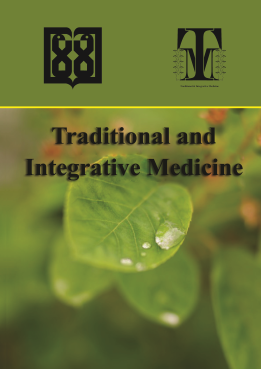Development and Validation of the “Treatment Satisfaction with Traditional Medicines” Questionnaire (TSTMQ)
Abstract
To develop and validate “Treatment Satisfaction with Traditional Medicines” Questionnaire (TSTMQ), a preliminary 22-item instrument was designed. Content validity ratio (CVR), content validity index (CVI), Intra-class correlation (ICC), and Cronbach alpha were measured, and exploratory and confirmatory factor analysis (EFA and CFA) were conducted. Data were analyzed using SPSS (17) and LISREL softwares (8.8). Finally, TSTMQ with 14 items and in three domains were confirmed after measuring CVR (> 0.62), CVI (> 0.79) and EFA. ICC for the entire questionnaire was 0.99 (95% CI: 0.95-0.99) (P<0.001), and Cronbach alpha was also 0.87. In CFA, all factor loadings and t-values were greater than 0.3 and 1.96, respectively. Also, χ2/df, RMSE and GFI were 2.6, 0.062, and 0.94, respectively. This study showed that the TSTMQ is a standard tool to measure treatment satisfaction with traditional medicine.
Kruk ME, Kelley E, Syed SB, Tarp F, Addison T, et al. Measuring quality of health-care services: what is known and where are the gaps? Bull World Health Organ 2017;95: 389-390.
Cleary PD, McNeil BJ. Patient satisfaction as an indicator of quality care. Inquiry1988; 25: 25-36.
Shikiar R, Rentz AM. Satisfaction with medication: an overview of conceptual, methodologic, and regulatory issues. Val Health 2004;7:204-215.
Manzoor F, Wei L, Hussain A, Asif M, Shah SIA. Patient satisfaction with health care services; an application of physician’s behavior as a moderator. Int J Environ Res Public Health 2019;16:3318.
Ng JH, Luk BH. Patient satisfaction: concept analysis in the healthcare context. Patient Educ Couns 2019;102:790-796.
Lenderking WR. Brief reflections on treatment satisfaction. Value Health 2005; 8 (suppl.1):S2-S5.
Campen CV, Sixma H, Friele RD, Kerssens JJ, Peters L. Quality of care and patient satisfaction: a review of measuring instruments. Med Care Res Rev1995;1:109-133.
Grogan S, Conner M , Norman P, Willits D, Porter I. Validation of a questionnaire measuring patient satisfaction with general practitioner services. Qual Health Care 2000;9:210-215.
Thayaparan AJ, Mahdi E. The patient satisfaction questionnaire short form (PSQ-18) as an adaptable, reliable, and validated tool for use in various settings. Med Educ online 2013;18:217-247.
Hawthorne G, Sansoni J, Hayes L, Marosszeky N, Sansoni E. Measuring patient satisfaction with health care treatment using the short assessment of patient satisfaction measure delivered superior and robust satisfaction estimate. J clin epidemiol 2014;67:527-537.
Atkinson MJ, Sinha A, Hass SL, Colman SS, Kumar RN, et al. Validation of a general measure of treatment satisfaction-the Treatment Satisfaction Questionnaire for Medication (TSQM)-using a national panel study of chronic disease. Health Qual Life Out 2004;2:12.
Bharmal M, Payne K, Atkinson MJ, Desrosiers MP, Morisky DE, et al.Validation of an abbreviated Treatment Satisfaction Questionnaire for Medication (TSQM-9) among patients on antihypertensive medications. Health Qual Life Out 2009;7:36
Abdshah A, Parsaeian M, Nasimi M, Ghiasi M. Validating the “Treatment Satisfaction Questionnaire for Medication” in persian, and evaluating treatment satisfaction among patients with psoriasis. Value in Health Reg Issues 2022;29:16-20.
Ruiz MA, Pardo A, Rejas J, Soto J, Villasante F, et al. Development and validation of the “Treatment Satisfaction with Medicines Questionnaire” (SATMED-Q). Value in Health 2008;11: 913-926.
Lawshe CH. A quantitative approach to content Validity. Personnel psychol 1975;28:563-575.
Mohammadbeigi A , Mohammadsalehi N , Aligol M. Validity and reliability of the instruments and types of measurments in health applied researches. J RafsanjanUniv Med Sci 2015;10:1153-1170.
Pazargadi M, Ashktorab T, Alavimajd H, Khosravi S. Developing an assessment tool for nursing students general clinical performance. Iran J Med Educ 2013;11:877-887.
Bagozzi RP, Edwards JR. A general approach for representing constructs in organizational research. Org Res Meth 1998;1:45-87.
Vahedi S. Validity, reliability and confirmatory factor analysis of the psychological seperation questionnaire. Educ Meas 2015;20:157-186.
Parasuraman A, Zeithaml VA. Servqual: A multiple-item scale for measuring consumer perceptions of service quality. J retailing1998;64:12-40.
Morisky DE, Ang A, Krousel‑Wood M, Ward HJ. Predictive validity of a medication adherence measure in an outpatient setting. J Clin Hypertens 2008;10:348-354.
Bani Asad MH, Pana MV, Hemmati M. Studying the belief of borderline personality disorder patient about the necessity of medication and the role of demographic factors in adherence to treatment. Am J Appl Psychol 2014;2:104-108.
Mondloch MV, Cole DC, Frank JW. Does how you do depend on how you think you'll do? A systematic review of the evidence for a relation between patients' recovery expectations and health outcomes. Canadian Med Ass J 2001;2:174-179.
Laferton JAC, Kube T, Salzmann S, Auer SJ, Shedden-Mora MC. Patients’ expectations regarding medical treatment: a critical review of concepts and their assessment. Front Psychol 2017;00233.
Habibovic M, Pedersen SS, Van den Broek KC, Denollet J. Monitoring treatment expectations in patients with an implantable cardioverter-defibrillator using the EXPECT-ICD scale. Europace 2014;16:1022-1027.
Naseri M, Ahmadi A, Gharegozli K , Nabavi M , Faghihzadeh S, et al. A double blind, placebo-controlled, crossover study on the effect of MS14, an herbal-marine drug, on quality of life in patients with multiple sclerosis. J Med Plants Res 2009;4:271-275.
| Files | ||
| Issue | Vol 7, No 3, 2022 | |
| Section | Research Article(s) | |
| DOI | https://doi.org/10.18502/tim.v7i3.10772 | |
| Keywords | ||
| Satisfaction Traditional medicine Questionnaire Iran Persian medicine | ||
| Rights and permissions | |

|
This work is licensed under a Creative Commons Attribution-NonCommercial 4.0 International License. |




